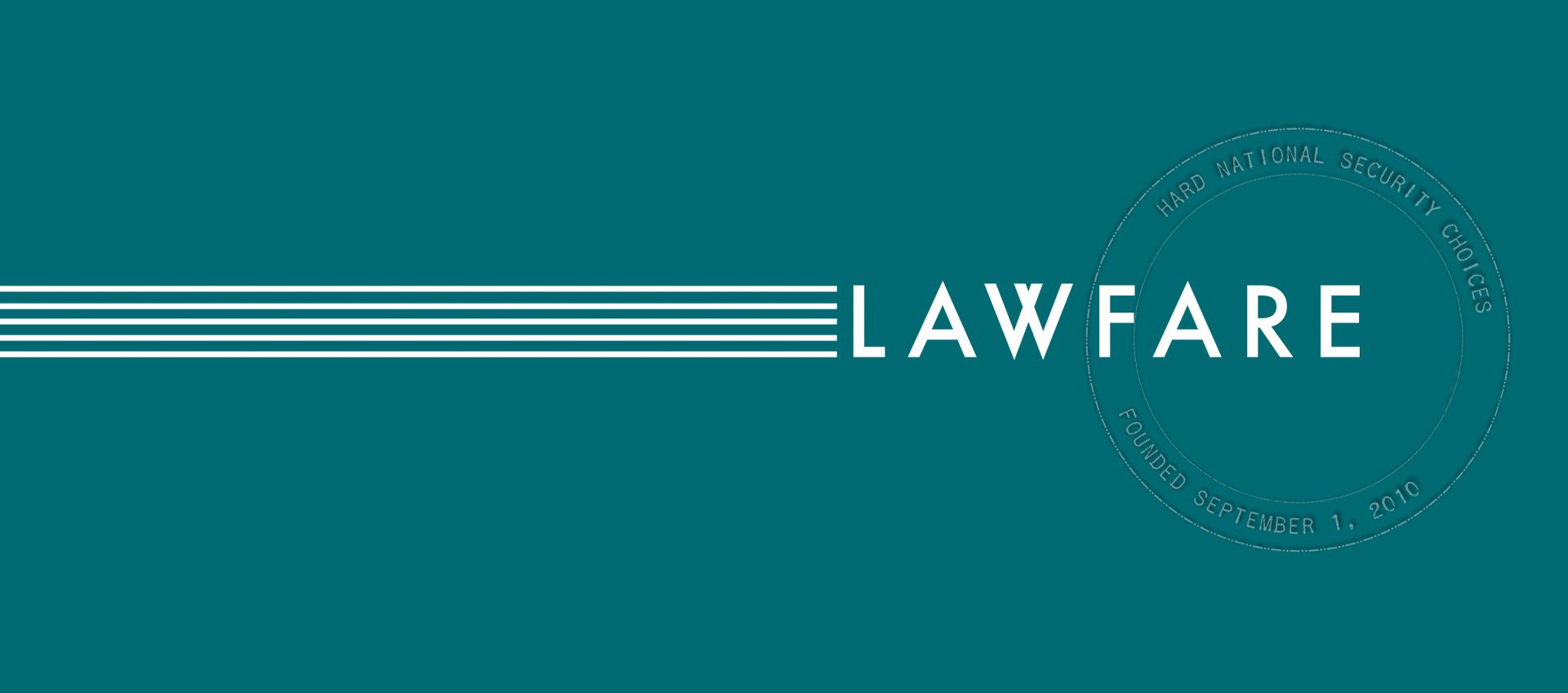The Week That Was: All of Lawfare in One Post
Your weekly summary of everything on the site.

Published by The Lawfare Institute
in Cooperation With

Vida B. Johnson discussed how the culture and practices of U.S. policing has caused law enforcement to treat Black and Brown Americans as a less-than-human enemy. Johnson discussed the deterioration of American law enforcement agencies and highlighted how responses to police misconduct often consist of inadequate disciplinary measures and insufficient institutional responses.
Roger Parloff evaluated claims put forward by several Proud Boys’ defense lawyers of prejudiced juries in the District of Columbia and their desire for change of venue. Parloff found the evidence needed to facilitate a change in venue to fall well short of attorneys’ claims.
Jeff Kosseff considered the impending lapse of Section 702 of the Foreign Intelligence Surveillance Act, which permits the warrantless surveillance of non-U.S. persons on American soil by the National Security Agency (NSA). Kosseff argued that to protect Section 702 and the invaluable intelligence collected under the statute, Congress must place greater restrictions on the FBI’s ability to access the program’s data.
Jack Goldsmith sat down with Paul Stephan on the Lawfare Podcast to discuss failures in international law, exemplified by the rise in populism, China’s growing hegemony, and Russian aggression in Ukraine. Goldsmith and Stephan also touched on the impacts of technology on the information environment, flaws in international courts and tribunals, and avenues toward restoring the rule of law globally.
Mykhailo Soldatenko analyzed the terms and flaws of the Budapest Memorandum, and highlighted how the ambiguous agreement failed to protect Ukraine from Russian aggression.
Teresa Chen, Alana Nance, and Han-ah Sumner surveyed recent tensions in the South China Sea, U.S. support for Taiwan amid recent Chinese aggression, the role of the Philippines and Japan as key American allies in the Pacific theater, and more in the latest edition of Water Wars.
On the Lawfare Podcast, Saraphin Dhanani sat down with Oriana Skylar Mastro to discuss strategies for deterring China from invading Taiwan, and the United States’ role in the ongoing conflict.
Sam Howell analyzed President Biden’s efforts to bring semiconductor policy to the forefront of the public discourse during his State of the Union address.
Dominic Solari and Simhanjana Sumathi parsed out key national security and foreign policy issues that President Biden discussed in his address to the nation.
On this week’s Rational Security, Scott R. Anderson, Quinta Jurecic, and Alan Rozenshtein were joined by Benjamin Wittes for a discussion of the week’s biggest “freak-outs” including the Chinese spy balloon incident, President Biden’s State of the Union address, ChatGPT’s debut, and more.
Colby Galliher considered how extremist threats to America’s vulnerable energy infrastructure are compounded by climate change-induced strains on power supplies. Gallihher urged regulators, governments, and power companies to respond to tangible threats of violence against these systems to prevent catastrophe.
On this week’s episode of Chatter, David Priess sat down with Kelly Weill to discuss her extensive reporting on flat earth beliefs, as well as her latest book, “Off the Edge: Flat Earthers, Conspiracy Culture, and Why People Will Believe Anything.”
Darren Linvill and Patrick Warren evaluated Elon Musk’s release of internal Twitter documents, drawing lessons for platform content moderation and its outside influences. They also detailed the online and political response to the release of the files.
On the Lawfare Podcast, Jurecic sat down with Dean Jackson to discuss his prior work on the January 6th committee and what evidence was omitted from the final report.
Robert Chesney shared “Cyberspace and Instability,” his new edited volume with James Shires and Max Smeets. The volume, published by the University of Edinburgh Press, is available for purchase or free online access.
Stephanie Pell sat down with Alex Iftimie on the Lawfare Podcast to discuss the Department of Justice’s recent disruption of the Hive ransomware group, Hives’s operation, the Justice Department’s disruption campaign, how this fits into the broader picture of U.S. government efforts against ransomware.
John Emmons shared the U.S. Treasury Department’s statement announcing sanctions against seven members of the Russia-based "Trickbot" cybercrime gang in coordination with the United Kingdom.
On the Lawfare Podcast, Goldsmith sat down with Bruce Schneier to discuss Schneier’s new book, “A Hacker's Mind: How the Powerful Bend Society's Rules and How to Bend Them Back.” They discussed what it means to have a hacker’s mind, why all systems are hackable, and what artificial intelligence will mean for hacking various systems.
And Paul Rosenzweig and Dan Geer evaluated the importance of standards in digital infrastructure and cybersecurity, and considered the role of standard-setting organizations.
And that was the week that was.


